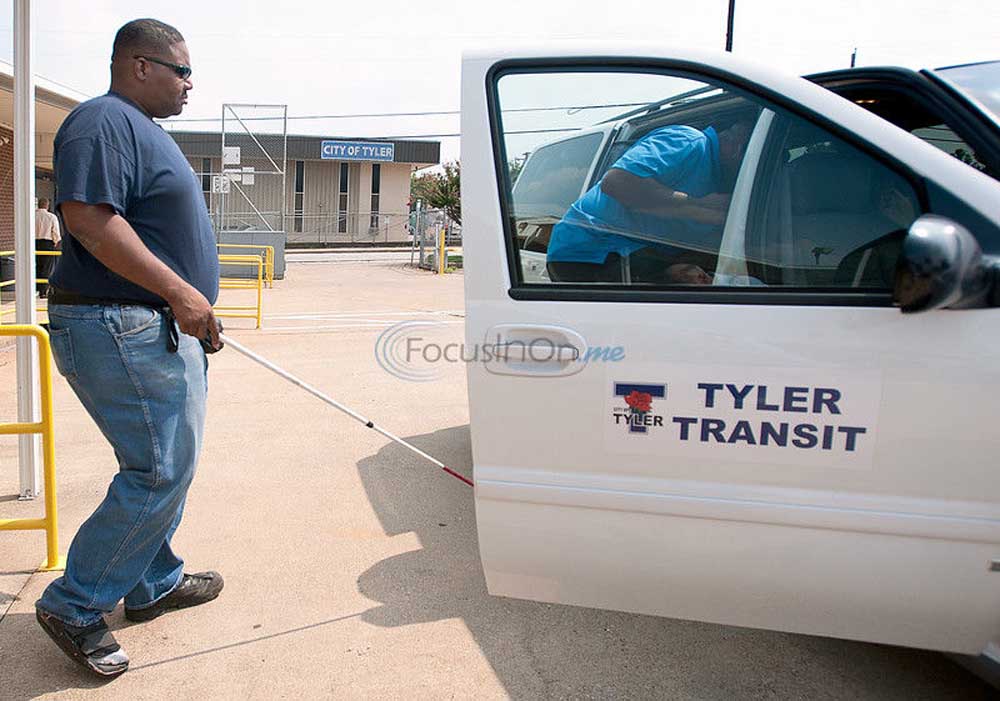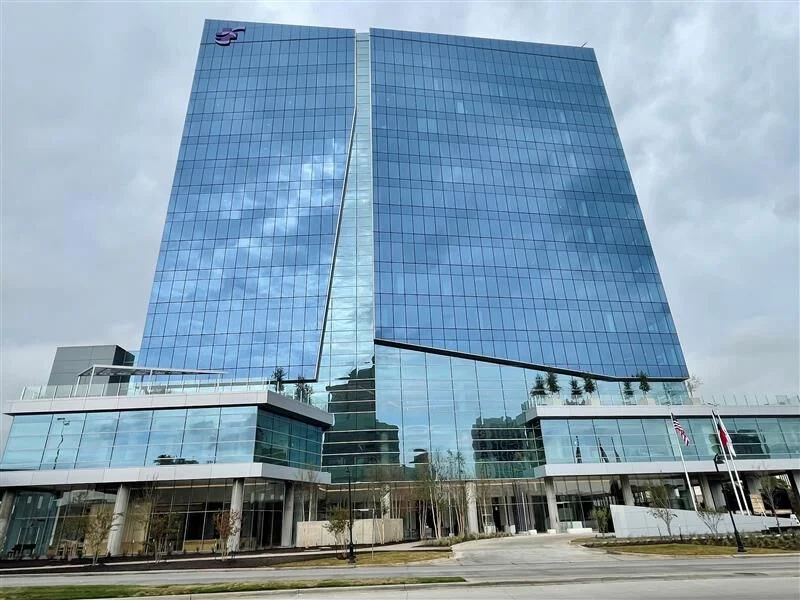City will not contract out paratransit
Published 11:50 am Thursday, July 24, 2014

- Curlie Bailey Jr. gets on a Tyler Transit van after work at Horizon Industries Tuesday afternoon. (Herb Nygren Jr/Staff)
By KELLY GOOCH, kgooch@tylerpaper.com
After conducting a monthslong comprehensive analysis, the city of Tyler has decided to keep its paratransit service in-house and add vehicles and drivers to keep up with current demand.
The analysis, which began in January, included a customer survey of the city’s paratransit service.
The city also looked at destinations such as medical facilities, work places, Lighthouse for the Blind and grocery and retail outlets; the number of trips individual customers take, the time it takes to dispatch and schedule paratransit rides and the time needed to handle customers.
Assistant City Manager Susan Guthrie said the city manager authorized keeping paratransit services in-house, and no city council action was needed. The analysis was conducted as a project through Lean Six Sigma, which focuses on municipal efficiency.
City of Tyler Director of Innovation Guillermo Garcia, who helped lead the Lean Six Sigma project analysis, said the project started in January and went through the latter part of June.
In 2007, the city ended its contract with First Transit, and from 2007 to 2010, the Transit Department provided paratransit services, Garcia said. Then in 2011, he said the city contracted with local taxi service NDMJ for paratransit service. That contract expired in December 2013, at which time the Federal Transit Administration encouraged the city to seek other bids.
There were two bidders — NDMJ and Florida-based Maruti Transit Group — but the city decided to take the service in-house while conducting an analysis this year to determine whether they should contract the service out or keep it in-house.
Garcia said the city believes it can provide better value and enhance service levels at a comparative cost to the city by doing paratransit service in-house.
He said customers also have a choice — continue riding with Tyler Transit or NDMJ or take advantage of the voucher system Smith County provides. He said the city can contract its paratransit service out in the future, if needed.
Additionally, Ms. Guthrie said, the city is mitigating its risks by keeping it in-house because it can audit itself and ensure compliance with federal guidelines.
NDMJ President Jamal Moharer disputed the findings, claiming the city is costing taxpayers more and is trying to compete with local taxi services.
But Ms. Guthrie previously said the city was told by federal partners that the contract needed to be rebid, and while NDMJ was a bidder, it was “not the apparent low bid.” Based on the analysis, which used bid numbers from NDMJ and Maruti, Tyler’s cost per trip came out at $11.56 compared to $17.43 for NDMJ and $13.61 for Maruti, “with the addition of revenue, application and reporting cost added,” Garcia said.
Therefore, even if the city had decided to contract out, Maruti would have won the bid, and the city cannot legally give preference to a local bidder, Ms. Guthrie said.
“Our responsibility as stewards of taxpayer dollars is to ensure that the taxpayer is receiving the necessary service for the least cost,” Mayor Martin Heines said. “In this case, the cost savings to the taxpayer outweighs outsourcing just for the sake of outsourcing.”
Garcia said the city notified vendors and customers of the analysis.
Toward the beginning of the analysis, the city’s paratransit service is described as a service to those who are disabled. It runs 6 a.m. to 8:15 p.m. Monday through Friday and 9 a.m. to 6 p.m. on Saturday.
A majority of funding for the city’s paratransit service comes from Federal Transit Administration grants. Garcia said the city also receives urban grant funding through the Texas Department of Transportation.
He said contracting the paratransit service out was costing $604,583 per year, $211,604 of which was paid for by the city. The rest was funded through grants.
Moharer said that after NDMJ’s contract with the city ended, the taxi service started referring people to Tyler Transit.
The result was a spike in riders for Tyler Transit, which had to decide how to quickly get these customers service, Ms. Guthrie said.
Before contracting with NDMJ, paratransit ridership averaged less than 2,000 trips per month, with a round trip as two separate trips, Garcia said. In June, there were 3,939 paratransit trips. Garcia recalled that Tyler paratransit recently had about 240 trips scheduled in one day. The recent average has been around 158 per day.
Garcia said all of the paratransit drivers do sensitivity training so they know things such as how to use wheelchair lifts and how to treat individuals when they take them to different destinations.
Paratransit will take a disabled individual to any destination within city limits.
In general, Garcia said, ridership spikes about noon, when people have gone to the doctor and dialysis and are ready to be picked up. He said customers who work at Lighthouse for the Blind are picked up together, and ridership dwindles toward the end of the day.
Based on the customer survey, people in general are pretty satisfied, and if there are things to correct, Tyler Transit tries to do so and move forward, Garcia said.
Lyle Jennings, 83, of Tyler, has been using the city’s paratransit service for about a year and recently had to wait more than two hours before he was picked up.
He said the experience was not typical.
Garcia said a lot of waiting happened when ridership spiked, and Tyler Transit adjusted and responded to the new demand. He said Tyler Transit has addressed the issue.
After the contract with NDMJ ended last year, Garcia said the city received a lot of feedback in regard to concerns about the city’s paratransit service. But after analyzing letters from concerned residents, he said the city found that 60 percent had never used Tyler Transit before and 35 percent were previous customers who hadn’t ridden since the city took its paratransit service in-house.
He said the city called these concerned residents, and once they were told exactly what their options were, they were pleased.
As far as the city’s paratransit service, customers must call the prior day for service and prequalify through the city’s application process, City Manager Mark McDaniel said. They must also prequalify through the city’s application process if they would like to receive service from NDMJ.
The city can do some same-day service, he previously said, but only if the customer or patron has exhausted other same-day service means. Customers who call on the same day are usually referred to NDMJ or another same-day service provider.
McDaniel previously said a paratransit customer whose trip goes between Tyler and somewhere outside Tyler city limits also could potentially get service from NDMJ using a voucher provided by Smith County.
Garcia said the city’s paratransit service is curb-to-curb and on occasion can be door-to-door. Caregivers can ride at no cost, and dates or friends can ride paratransit for $1.50.
In regard to drivers, he said the city has the ability to alternate them between paratransit and the fixed route. There are nine drivers for paratransit and fixed-route, two of which are part-time, but more drivers are anticipated.
Garcia said Tyler Transit also is expected to purchase two additional vans, along with additional equipment to help fix Tyler Transit buses, thanks to a $217,737 grant that has been awarded. He said another grant also has been awarded, which will provide enough money to purchase a bus and another van.






